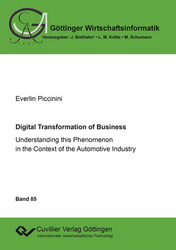| Fachbereiche | |
|---|---|
| Buchreihen (96) |
1381
|
| Nachhaltigkeit |
3
|
| Gesundheitswesen |
1
|
| Geisteswissenschaften |
2370
|
| Medienwissenschaften | 16 |
| Theologie | 57 |
| Philosophie | 102 |
| Rechtswissenschaft | 424 |
| Wirtschaftswissenschaften | 851 |
| Sozialwissenschaften | 418 |
| Sportwissenschaften | 48 |
| Psychologie | 233 |
| Pädagogik | 190 |
| Geschichtswissenschaften | 183 |
| Kunstwissenschaften | 111 |
| Kulturwissenschaften | 166 |
| Literaturwissenschaften | 117 |
| Sprachwissenschaften | 88 |
| Naturwissenschaften |
5408
|
| Ingenieurwissenschaften |
1795
|
| Allgemein |
98
|
|
Leitlinien Unfallchirurgie
5. Auflage bestellen |
|
Erweiterte Suche
Digital Transformation of Business (Band 85)
Understanding this Phenomenon in the Context of the Automotive Industry
Everlin Piccinini (Autor)Vorschau
Leseprobe, Datei (810 KB)
Inhaltsverzeichnis, Datei (570 KB)
History of corporations is replete with stories of fundamental organizational change in the face of breakthroughs in technology and significant economic changes. Yet pervasive digitalization, i.e., a socio-technical process whereby digital technology capabilities are embedded into everyday artifacts and life, altering everyday experiences and interactions, brings about substantial changes in environmental conditions not seen before. The fast-paced, unbounded, ongoing, and potentially disruptive nature of change in today’s digitized world is fueled by the generativity of digital innovation, forcing incumbents across industries to transform and adapt. This cumulative dissertation presents five studies that provide a comprehensive understanding on the emerging phenomenon of digital transformation of business. With the help of primary data collected from more than 40 industry experts as well as secondary data, it aimed at explaining through a configurational perspective how, in certain contextual conditions, a combination of particular mechanisms, may lead automotive manufacturing organizations to embark on a sustainable digital transformation of their business. Overall, the findings derive a holistic view of the investigated phenomenon, indicating that it stems from socio-technical developments in the macro, meso, and micro levels of business, fostering incumbents to build new mechanisms that activate digital transformation capabilities to rapidly respond to such socio-technical developments, fundamentally altering their traditional business logics. Nevertheless, research on the phenomenon of digital transformation is in its infancy in both information systems and organizational science research, therefore more in-depth empirical accounts are still needed.
| ISBN-13 (Printausgabe) | 9783736993235 |
| ISBN-13 (E-Book) | 9783736983236 |
| Buchendformat | A5 |
| Sprache | Englisch |
| Seitenanzahl | 196 |
| Umschlagkaschierung | glänzend |
| Auflage | 1. |
| Buchreihe | Göttinger Wirtschaftsinformatik |
| Band | 85 |
| Erscheinungsort | Göttingen |
| Promotionsort | Göttingen |
| Erscheinungsdatum | 26.08.2016 |
| Allgemeine Einordnung | Dissertation |
| Fachbereiche |
Wirtschaftswissenschaften
|
| Schlagwörter | Digitaltransformation, Digital innovation, automotive industry |








